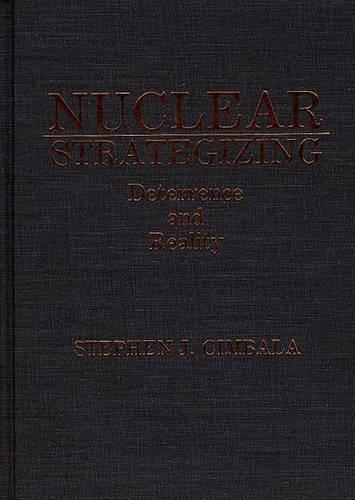
Nuclear Strategizing: Deterrence and Reality
(Hardback)
Publishing Details
Nuclear Strategizing: Deterrence and Reality
By (Author) Stephen J. Cimbala
Bloomsbury Publishing PLC
Praeger Publishers Inc
3rd August 1988
United States
Classifications
Tertiary Education
Non Fiction
355.0217
Physical Properties
Hardback
316
Description
This is an excellent advanced study in strategy in the nuclear age. Cimbala covers the field thoroughly. He challenges much of the conventional and established approaches to deterrence and crisis management. . . . Cimbala's work is a valuable and refreshing addition to the literature. Scholars will find it enriching and challenging. . . . This is a must acquisition for university and professional libraries. Choice Cimbala critically examines the rational behind Western defense policies based on deterrence. According to the author, nuclear strategizing--or coping with outside threats--is shortsighted--dependent as it is on economic analogies and technical fixation. It leaves unanswered important questions about the relationships between strategy, politics, and long-term defense goals. Cimbala examines a number of issues from this point of departure, including: arms control, de-escalation and escalation, control of nuclear forecast, and the future of conventional forces.
Reviews
. . . thought-provoking analyses of such related topics as nuclear surprise, ' escalation, ' and missile . . . escapism' call into question the ability of the United States to effectively defend its allies in a real conflict.-Sea Power
This is an excellent advanced study in strategy in the nuclear age. Cimbala covers the field thoroughly. He challenges much of the conventional and established approaches to deterrence and crisis managament. Cimbala suggests, for example, that a decision maker in a crisis situation attempts to cope with a developing situation rather than rationally consider predetermined options. It is a well-written and thoroughly researched book, one that is not overburdened with jargon and mathematical formulae. Cimbala's work is a valuable and refreshing addition to the literature. Scholars will find it enriching and challenging. It is a work that could be used in advanced and graduate courses in national security and strategic studies. This is a must acquisition for university and professional libraries.-Choice
." . . thought-provoking analyses of such related topics as nuclear surprise, ' escalation, ' and missile . . . escapism' call into question the ability of the United States to effectively defend its allies in a real conflict."-Sea Power
"This is an excellent advanced study in strategy in the nuclear age. Cimbala covers the field thoroughly. He challenges much of the conventional and established approaches to deterrence and crisis managament. Cimbala suggests, for example, that a decision maker in a crisis situation attempts to cope with a developing situation rather than rationally consider predetermined options. It is a well-written and thoroughly researched book, one that is not overburdened with jargon and mathematical formulae. Cimbala's work is a valuable and refreshing addition to the literature. Scholars will find it enriching and challenging. It is a work that could be used in advanced and graduate courses in national security and strategic studies. This is a must acquisition for university and professional libraries."-Choice
Author Bio
STEPHEN J. CIMBALA is Professor of Political Science at Pennsylvania State University.
